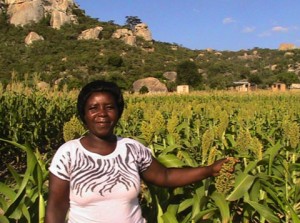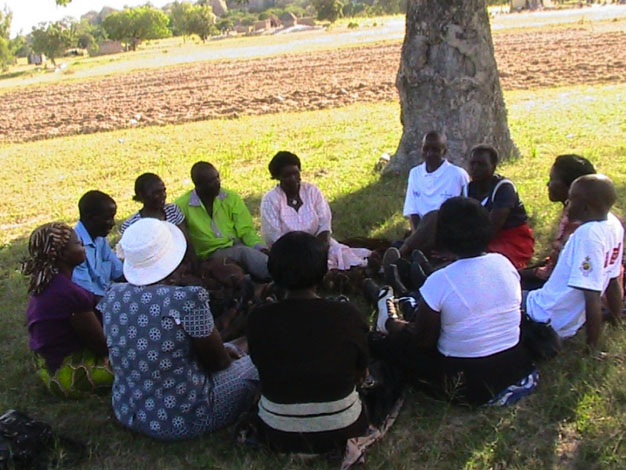Circles of life: Community groups in Zimbabwe turn early warnings into early action
Date:

For years Beauty, 52, carried out menial tasks in return for food in Mashonaland East, a rural district in Zimbabwe. She couldn't sell at the city market because it was considered neither safe nor appropriate for women in her community, where vendors routinely wait overnight for markets to open. She was little involved in village decisions about its agricultural or economic affairs.
But today Beauty's attitude, and that of her community, has changed, as the result of a project run by the Nyahunure Community Trust, supported by UN Women.
“I had no knowledge of conservation farming, and lacked confidence as a woman that I can do things on my own, she recalled, now a grain and butternut farmer. “I have learnt to champion the markets on my own. I now have money in the bank and can pay for a decent place to sleep while I wait for the market to open.
Since 2010, the Trust has been working with UN Women and local partners to bring 300 people, two-thirds of them women, into community empowerment circles. Here, activities such as trainings, discussions, community theatre, songs and traditional dance, generate awareness and skills development. Much of the training aims to alleviate the effects of climate change, and its impact on women.
Agricultural work in Zimbabwe often falls to older women, since many men and young people migrate out of rural areas in search of better livelihoods. Women are left to face the challenges of climate change - irregular rainfall patterns, drought, and severe food shortages caused by low crop yields - while rarely being included in community decision-making. Women's insights and experiences in preparing for disaster are overlooked, while their often lower levels of education and technical skill reduce their chance of success in politics or business.
Trainers are helping the community in Mashonaland East to understand how climate change and gender affects their lives and livelihoods. Ways of harvesting and conserving water, using alternative farming methods, and enhancing carbon sinks (which remove carbon dioxide from the atmosphere) through tree-planting and forestry preservation are being explored.
UN Women has also arranged for exchange visits between community members and other successful farmers throughout Zimbabwe.
“I am most thankful for the water conservation lessons; we can conserve water during the rainy season and use it to water our gardens after we harvest, said Tabeth Kazingizi, a sesame farmer. “We were trained on how to operate treadle pumps on our own, so it's farming all year round.
Each empowerment circle comprises women and men, and includes the traditional Chief, the local Councilor and an Agricultural Extension Officer from the Ministry of Agriculture. The Trust works with trainers from the Ministry as well as Forestry Commission officers.

For the community, the benefit has spread beyond economic empowerment and food security to other aspects of well bring. For example, through song and drama, the women have often reported on how poverty fuels domestic violence, and the fights that take place when men and women don't share spending decisions.
“Our husbands' consciousness has shifted since they started attending the empowerment circles; I can now go to the market in the city together with my husband and make decisions on how to use our money, said Tabeth. Beauty, meanwhile, has sent each of her six children to school with her proceeds from farming.
The involvement of women in decision-making in Mashonaland East is ensuring that benefits are garnered for the environment, and for the generations to come.